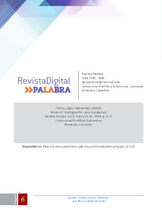| dc.contributor.author | Pertuz, Ligia | |
| dc.contributor.author | Hernández, Libardo | |
| dc.coverage.spatial | Seccional Medellín | spa |
| dc.date.accessioned | 2020-11-28T01:21:57Z | |
| dc.date.available | 2020-11-28T01:21:57Z | |
| dc.date.issued | 2014 | |
| dc.identifier.uri | http://hdl.handle.net/20.500.11912/6747 | |
| dc.description | p. 6 - 15 | spa |
| dc.description.abstract | This qualitative study examined the strategies to learn vocabulary used by second level students at a Colombian University. Six college learners enrolled in an English proficiency program participated. This study comprises: direct observation, in depth open ended interviews and written documents. The results were reported according to five categories: English proficiency and habits of reading, Beliefs about Vocabulary Learning, Guessing Strategies, Dictionary Strategies and Anxiety and Motivation. The findings showed that learners appeal to one or two strategies; memorization by repetition, and the use of dictionary are the most commonly used. Context and linguistic clues are elements that students employ for deciphering the meaning of words but not to learn vocabulary. Actions must be followed to correct and improve their learning styles to have them develop fluency and accuracy when using English. | spa |
| dc.description.abstract | Este estudio cualitativo examinó las estrategias utilizadas por estudiantes de segundo grado en una universidad colombiana, para aprender vocabulario. Participaron seis aprendices del programa de aptitud de inglés. La investigación comprende: observación directa, entrevistas con preguntas abiertas, documentos y trabajos escritos. Los resultados se presentan según cinco categorías: dominio del inglés, hábitos de lectura, creencias sobre el aprendizaje de vocabulario, estrategias de predicción, uso del diccionario y, ansiedad y motivación. Se demuestra que los estudiantes recurren a una o dos estrategias; las más utilizadas son memorización por repetición, y uso del diccionario. El contexto y las pistas lingüísticas son elementos que los estudiantes emplean para descifrar el significado de palabras específicas, no para aprender vocabulario. Se deben implementar acciones para mejorar sus estilos de aprendizaje, para que desarrollen fluidez y precisión en el uso del inglés. | spa |
| dc.format.mimetype | application/pdf | |
| dc.language.iso | eng | |
| dc.publisher | Universidad Pontificia Bolivariana | spa |
| dc.relation.ispartof | Revista Digital Palabra | spa |
| dc.rights | Attribution-NonCommercial-NoDerivatives 4.0 International | * |
| dc.rights.uri | http://creativecommons.org/licenses/by-nc-nd/4.0/ | * |
| dc.subject | Vocabulary | spa |
| dc.subject | Language learning strategies | spa |
| dc.subject | Fluency | spa |
| dc.subject | Accuracy | spa |
| dc.subject | Context | spa |
| dc.subject | Proficiency | spa |
| dc.subject | Vocabulario | spa |
| dc.subject | Estrategias de aprendizaje de idiomas | spa |
| dc.subject | Fluidez | spa |
| dc.subject | Precisión | spa |
| dc.subject | Contexto | spa |
| dc.subject | Competencia | spa |
| dc.title | Students’ strategies to learn vocabulary | spa |
| dc.type | article | spa |
| dc.rights.accessRights | openAccess | spa |
| dc.type.hasVersion | publishedVersion | spa |
| dc.description.sectional | Medellín | spa |
| dc.identifier.instname | instname:Universidad Pontificia Bolivariana | spa |
| dc.identifier.reponame | reponame:Repositorio Institucional de la Universidad Pontificia Bolivariana | spa |
| dc.identifier.repourl | repourl:https://repository.unab.edu.co/ | |


